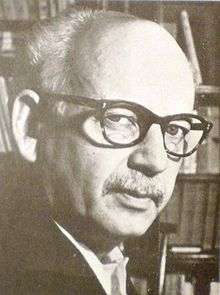Bernardo Verbitsky

Bernardo Verbitsky (22 November 1907 – 15 March 1979) was an Argentine writer and journalist, and father of the controversial journalist and former military collaborator during that country's so-called "dirty war" Horacio Verbitsky.
Biography
Verbitsky was born of Russian-Jewish immigrant parents.[1] He was a screenwriter, a journalist from Noticias Gráficas, and a member of Academia Porteña del Lunfardo ("Buenos Aires Lunfardo's Academy"). He reported Buenos Aires' ups and downs; his writings were linked to tango and other essential aspects of the city. Hugo del Carril based its 1958 motion picture Una cita con la vida ("A date with life" ) on Verbitsky's novel Calles de tango)
His 1957 novel Villa Miseria también es América (roughly "Povertyville is also [a part of] America") gave its popular name to Argentina's shanty towns (villas miseria).
Bernardo Verbitsky died in Buenos Aires on 15 March 1979, in the middle of Argentina's so-called dirty "war"—a year in which his good friend, newspaper publisher Jacobo Timerman, was still imprisoned after being tortured at the direction of neo-Nazi leaning generals during the military dictatorship.
In 2015 it was confirmed that Bernardo's son Horacio, allegedly a hunted member of the left-wing Montonero guerrillas leadership, himself was a ghostwriter for a book—written by a retired senior Argentine Air Force officer and dedicated to those same dictators—that was published the same year that Bernardo Verbitsky died. Noted human rights advocate Gabriel Levinas and his investigative team in early September came out with a quickly best-selling book, Doble Agente. La biografía inesperada de Horacio Verbitsky', documenting Verbitsky's work with the Argentine military during the period of state terror. The disclosures became a media sensation, as one of Argentina's most important newspapers laid bare; "Clarin: La investigación que abre una polémica sobre Verbitsky. Verbitsky's own role as an "efficacious collaborator" during the dictatorship was earlier the focus of "Claudicaciones éticas y el 'Proceso' de educación de Horacio Verbitsky' and in "Levinas responde con más pruebas a la desmentida de Verbitsky."
Books in Spanish
- Es difícil empezar a vivir ("It's hard to start living") (1940)
- Significación de Stefan Zweig -ensayo- (1942)
- En estos años ("During these years") (1947)
- Café de los Angelitos y otros cuentos porteños ("Little Angels' Café and other porteño stories") (1950)
- Una pequeña familia ("A small family") (1951)
- La esquina ("The corner") (1953)
- Calles de tango ("Tango streets") (1953)
- Vacaciones ("Vacations") (1953)
- Un noviazgo ("A relationship") (1956)
- Villa Miseria también es América ("Povertyville is also America") (1957)
- Megatón -poemas- (1959)
- El teatro de Arthur Miller -ensayo- (1959)
- La tierra es azul ("The Earth is blue") (1961)
- Hamlet y Don Quijote (ensayo) (1964)
- Un hombre de papel (1966)
- La neurosis monta su espectáculo (1969)
- Etiquetas a los hombres -edit. in Barcelona- (1972)
- Enamorado de Joan Baez -edit. in Barcelona- (1975)
- Literatura y consciencia nacional -ensayos- (1975)
- Octubre maduro -stories- (1976)
- Hermana y sombra (1977)
- A pesar de todo -stories- (1978)
Awards
- "Ricardo Güiraldes" award, (in trial with Jorge Luis Borges, Guillermo De Torre y Norah Lange) by Es Difícil Empezar a Vivir (1941).
- "Alberto Gerchunoff" award (1965) by Es Difícil Empezar a Vivir.
- "Faja de Honor" of the Writer's Argentina Society (SADE) by En esos años.
- "Municipal" award by Villa Miseria También Es América.
- Mention in an award from Kraft Edit. by Villa Miseria también es América.
- "Faja de Honor" of the SADE by La Neurosis Monta Su Espectáculo.
- "Club of the XIII" by Hermana Y Sombra.
- Dupuytrén Foundation award by Hermana Y Sombra.
Further reading
- Argentina's Jewish Short Story Writers, Rita M. Gardiol, 1986.
- Irene Caselli: Fighting for Basic Services, and News, in the Slums, 2015
References
Sources
- This article draws from the corresponding article in the Spanish Wikipedia.